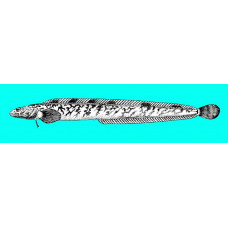Latin name
Lumpenus fabricii
Other name
Blennius lumpenus, gunnellus fabricii, lumpenus anguillaris, lumpenus nubilus.
Identification
The Slender Eelblenny has a broad head and a terminal mouth. Its lower lip is divided and has weak skin lobes. It has 70-73 vertebrae.
Features of fish fins
The dorsal fin rays of these fish gradually shorten toward the front until they are barely visible, with only one or two remaining. These rays are not connected by a common membrane. The anal fin remains the same height throughout; its posterior rays do not lengthen. The posterior rays of the dorsal and anal fins do not extend to the caudal fin's base.
Fish colouring
The slender eelblenny has a yellow body with dark, winding streaks on its sides. Its dorsal fin has scattered spots, its caudal fin has four dark, transverse stripes, and its other fins are pale yellow.
Distribution
Circumpolar Fishes: These fish are widespread in the Arctic, the North Pacific, and the Northwest Atlantic. They are found in the Barents Sea and extend eastward to western Greenland. In the Pacific, they inhabit southeastern Alaska and the northern part of the Sea of Okhotsk. In the western Atlantic, they are found off the coast of Nova Scotia.
Habitat
Polar marine demersal species. They inhabit depths ranging from 0 to 235 meters and are found on sandy and rocky bottoms, often in seagrass or algae. They are rarely, if ever, found in the intertidal zone.
Size
Males of this species reach a maximum length of 36.5 cm.
Behavior
In the White Sea, this species is often found in the summer at depths ranging from 4 to 69 meters, where the bottom temperature can reach 9 to 13° and the salinity is 25.5 to 28.3 ‰. In the Barents Sea, it is known to inhabit greater depths, typically in areas with temperatures close to zero and much higher salinities. In Kola Bay, it was once found in the littoral zone. In the Chukchi Sea, it has been found repeatedly at depths of 35 to 57 meters and temperatures ranging from -1.6 to 1.6°.
Food and feeding habits
The slender eelblenny feeds on crustaceans, worms, mollusks, and fish eggs.
Reproduction
A 164-millimeter-long female from the southwestern Kara Sea had 490 nearly mature eggs, each up to three millimeters in diameter. Spawning appears to have occurred in October or November.
Fishing
This species is not commercially important.
Relationship with a person
Harmless.
| Classification | |
| Phylum | Chordata |
| Class | Actinopterygii |
| Squad | Perciformes |
| Family | Stichaeidae |
| Genus | Lumpenus |
| Species | L. fabricii |
| Features | |
| Conservation status | Not Evaluated |
| Habitat | Bottom |
| Life span, years | No information |
| Maximum body weight, kg | No information |
| Maximum length, cm | 36,5 |
| Sailing speed, m/s | No information |
| Threat to people | Edible |
| Way of eating | Planktonophage |
Slender eelblenny
Tags: slender eelblenny

